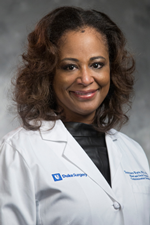
This story is part of an ongoing series of reflections from Duke Section of Surgical Disciplines faculty and staff.
The first weeks and months of a multi-year research study pose the formidable task of establishing sound protocols and procedures that ensure the study’s success. For Tammara Watts, MD, PhD, Associate Professor of Head and Neck Surgery and Communication Sciences, matters were further complicated by the closure of all laboratories in March 2020 due to the COVID-19 pandemic, just a few months after she became a faculty member at Duke and began research here.
“I’m at a critical juncture in my research program and development,” says Dr. Watts. “The shutdown presented a different fork in the road. It’s difficult enough to start work at a new institution—you are trying to make new connections, learn the environment, learn the ropes, figure out who the key players are, and then all of your work comes to a grinding halt three months before the NIH deadline.”
Dr. Watts’ research focuses on improving care for patients with cancer of the head and neck, including
cancers in the oral cavity, oral pharynx and tonsils, and head and neck squamous cell carcinoma. She was meant to have 75% protected time in the laboratory for research during her first years at Duke.
“We look at the signaling pathways and see how blocking interactions with certain drugs and molecules can improve responsiveness to chemotherapy and radiation,” says Dr. Watts. “In any research, it takes months to get your materials, to set-up transfer agreements with other institutions, to allocate resources for salaries for laboratory staff. The lab wasn’t fully off the ground before the shut down.”
Working remotely was the only option, but for a new research study, the lack of data to analyze made this nearly impossible. Fortunately, Duke research labs have slowly come back to life over the summer, with proper safety protocols in place. Dr. Watts is currently in the process of ordering supplies and gearing up to begin actual experiments again soon. Using what she’s learned from the initial shutdown, she is making preparations in the case it happens again.
“This experience has really given me a different perspective,” Dr. Watts says. “The question initially wasn’t whether or not the science in the research was good, but whether or not I would be able to conduct the science at all. The people here at Duke, though, have been fantastic. You might think that investigators would not have been as generous with their time, so that has way beyond exceeded my expectations.”
Dr. Watts says the collegiality at Duke has been benficial during her first year. Even as the recent national focus on racial inequity has tested the resolve of the medical and research community, Dr. Watts says the Department of Head and Neck Surgery & Communication Sciences, led by Dr. Howard Francis, has been supportive.
“I attribute a lot to our department led by Dr. Francis,” says Dr. Watts. “He is a black man in leadership, and our department holds to its core values, which talk about respect and creating an environment that is welcoming of all and inclusive. Even when we are interviewing residents, we ask questions to determine if their values fall in line with our values as a department.”
Dr. Watts says the department’s prioritization of these initiatives has provided a foundation for success. She looks forward to her team returning to the lab soon, and continuing her research that will improve efficacy of care for head and neck cancer patients.